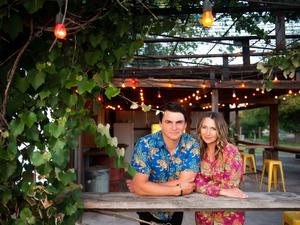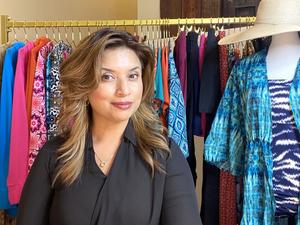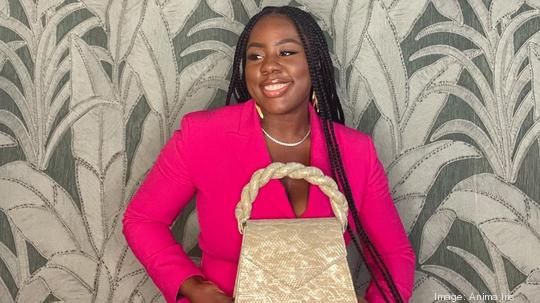
With a focus on Greater Philadelphia small businesses and entrepreneurs, "The Creators" is a weekly feature presented by PHL Inno. Check back each Monday for a new profile on a local business. Have a story you think we should know about? Email associate editor Lisa Dukart at ldukart@bizjournals.com.
Wilglory Tanjong had a feeling her business would be big one day, she just didn’t expect it to happen quite so quickly.
Just two years after launching Anima Iris, Tanjong's luxury handbag brand is closing in on $1 million in revenue, a milestone it expects to achieve by the end of March.
An MBA student at the Wharton School of the University of Pennsylvania, Tanjong – who earned her bachelor’s degree from Princeton University – thought the business would grow incrementally while she pursued her graduate studies. But several big moments led the brand to far outpace her expectations. One included a viral moment on Twitter, which led to her selling out of product for the first time.
Then came two big celebrity moments. Beyoncé requested some Anima Iris bags, ultimately wearing and sharing photos of one of the creations to her hundreds of millions of Instagram followers last August. “For her to wear my bag, that is still today one of the proudest moments of my life,” Tanjong said. The Beyoncé effect led to another sellout and the brand closing the month with $100,000 in sales.
Another watershed moment came when Anima Iris bags were twice spotted on the HBO hit series “Insecure,” which was created by and stars Issa Rae. “It was a huge cultural moment for me,” Tanjong said, noting it is “one of the most poignant shows that really captured the issues that young Black people were facing.”
Being on the show was quite fitting given the inspiration for Anima Iris. When Tanjong officially launched the brand in February 2020, she was hoping to cover some of the funds she had spent on her roughly six-month-long hiatus from work. Burned out and still not having fully processed the recent passing of her mother, Tanjong decided to take time away from the corporate world. “I really wanted to prioritize my mental health,” she said. “I never really stopped to just kind of breathe and take care of myself and think about how am I going to navigate life without the most important person that I've ever known and ever loved?”
Inspired by a story she’d read about African youth – Tanjong was born in Cameroon but grew up in Maryland – she decided to experience it firsthand, spending time in Ghana, Kenya and Senegal.
While there, she interviewed entrepreneurs for her African Hustle series, eventually coming across artisans crafting handbags. She worked with those artisans and brought 50 bags with her back to the U.S., selling them online. Between her travels, accommodations and the materials and creation of the bags, Tanjong estimates she spent about $5,000 and was looking to recoup some of those funds.
The business, which is wholly self-funded, quickly proved a success. Not long after launch, Tanjong decided to quit her job and relocate herself and the business to Philadelphia. Soon thereafter, she also decided to apply to a dual degree program at Wharton and the Lauder Institute, where she focused on African studies. But as Anima Iris gained steam – it made about $125,000 in its first year and $600,000 in 2021 – Tanjong knew she’d have to give something up and so left the Lauder program to focus on business and business school, where she will graduate this May.
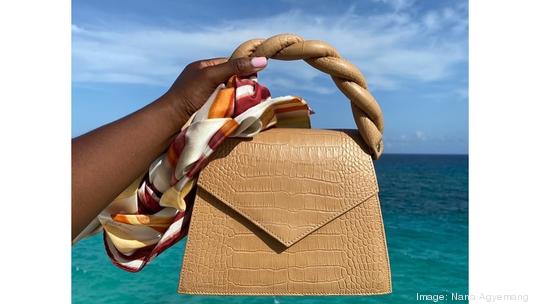
Despite most of her two years in business coinciding with a global health crisis, the Covid-19 pandemic at times proved advantageous, especially when classes were remote. That allowed Tanjong time to fulfill orders, and she even traveled to and stayed in Senegal to oversee operations at times.
She attributes part of her success to creating more than just a brand, but a community, especially on social media. “Women of color, especially Black women of color, really aren't represented in the luxury fashion scene,” she said. At Anima Iris, they’re front and center. That culture of community has translated to sales, with numerous return customers.
Sales are largely in the U.S., but Anima Iris ships globally with consumers in Africa, Europe and even Japan. All of the bags continue to be hand crafted in Senegal using Tanjong’s original designs. Thanks to streamlining the process, her team of artisans can produce about 500 bags a month. Made from leather, the bags retail for between $350 and over $2,000.
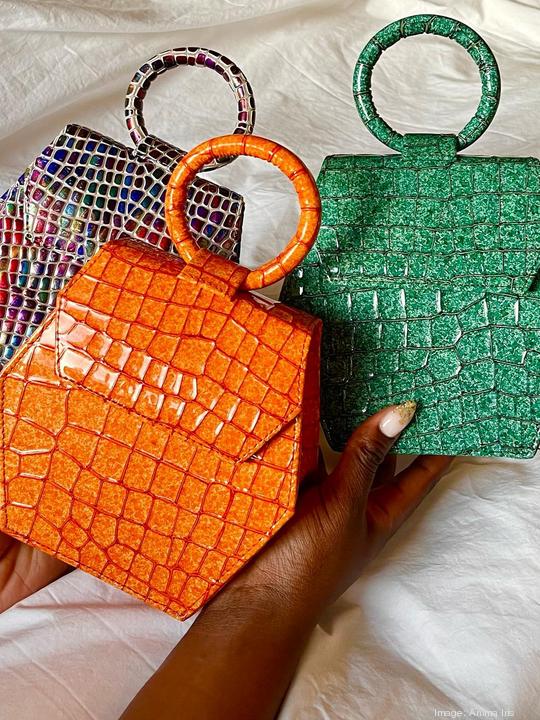
While many sales are direct to consumer, Anima Iris is also stocked at retailers Revolve and Nordstrom and is expected to launch at Saks Fifth Avenue this spring.
“2022 is Anima Iris' year. This is the year that we really become one of the most notable handbag brands and I feel like not just only amongst Black designers, but just in general,” Tanjong said.
What inspires your designs?
I take inspiration a lot from geometry. There's just something about shapes that's always really been so interesting to me. And I think especially in my own Cameroonian culture, there's a lot of geometric shapes within our fabrics and materials, and I'm definitely inspired by that. I'm also inspired by how bright and colorful our culture is in the clothing that we wear, the food that we eat, all of it is very, very bright and I love that. Anima Iris is mostly bright handbags. We have black handbags, but mostly colorful bags. I'm also inspired by random things I see.
What’s the creation process like?
What I've done is really made the operation a whole lot more efficient. One of the first things I really had to do as I started growing, I started working with more artisans, but they were working individually, and they've never worked together as a team. … We started thinking about how can we have certain materials prepped? How can we ensure that the things that some people are really good at, and they're very strong at, they're doing it instead of other things, so that makes it a lot faster. I was able to increase operational capacity with this same team by 30%. Now we're able to do 20 to 25 bags a day. I think it used to be like maybe five or 10.
How have the celebrity nods impacted business?
Beyoncé's impact was undeniable. We had been doing really well last summer. When I finished school for the summer, I actually had doubled our revenue. The bags were going super fast. That [August] we were going to do about $50,000, which I was really excited about. That would have been our biggest month yet. And then Beyoncé wore the bag and everyone swooped in. We ended up doing $100,000 that month. It was huge for me – it was an emotional moment and it was a big financial moment.
What do you see long-term for Anima Iris?
In a perfect world, we are selling bags, we're selling jewelry, we're selling makeup, we're selling shoes, we're selling clothes, we're selling furniture. I love home decor. But everything is made in Africa. That's really important to me, to provide jobs back to people that are sustainable, that are well paid, to be part of Africa's growth narrative, really bringing our culture. I think people really love and resonate with that. In an ideal world Anima Iris is going to be a full lifestyle brand.
